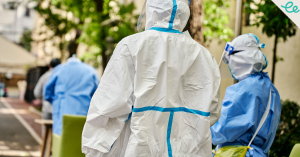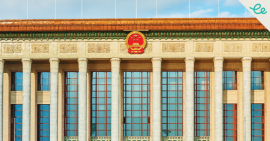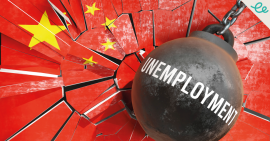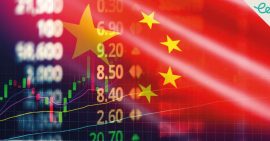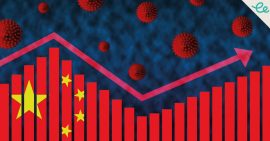Tough Omicron measures persist despite economic growth impact
The Chinese economy’s just fine, thanks. Don’t talk down China GDP, or blame our zero-Covid tactics for slowing growth. Beijing remains publicly committed to maintaining the world’s toughest response to the pandemic, now over two years old. This approach, locking down millions and stifling key ports, still succeeds in keeping China’s Covid death toll at world-beating low levels, but at an increasingly high cost to the domestic and world economy.
So the authorities have reverted to another tried and trusted tactic: silencing the naysayers. In recent days, outspoken economists and prominent investors have been silenced on social media in China. Beijing is tightening its grip on online speech amid mounting economic pressure and controversies surrounding its zero-Covid policy.
Hong Hao, one of China’s highest-profile market strategists, has left his state-owned employer after his social-media accounts were censored. Based in Hong Kong, Hong’s critical posts included the economic impact of lockdowns: “Shanghai: zero movement, zero GDP” he Tweeted in March as authorities began a strict lockdown in Shanghai that continues weeks later.
The platform has also suspended the accounts of Fu Peng, chief economist at Northeast Securities; Dan Bin, chairman of Shenzhen Oriental Harbor Investment; and Wu Yuefeng, partner and fund manager with Beijing-based Funding Capital.
At state news agency Xinhua, writer Zhao Wencai slammed the Western media and spread positive energy for China (which is Xinhua’s job, of course). By strictly enforcing the “dynamic zero-COVID policy”, China is “making a huge sacrifice to ensure the long-term economic viability of Shanghai in global trade and commerce, which would inject more certainty into the world economy.”
But for all its censorship and propaganda, Beijing can’t hold back the wave of negative forecasts about economic growth. In an already tough global environment, lockdowns in the world’s second largest economy translate into tougher times for all. And ramp up pressure on Beijing which is committed to achieving an overly ambitious GDP target of “around 5.5%” for 2022.
Forecasts
This week Fitch Ratings trimmed its 2022 growth estimate to 4.3% from 4.8% due to Covid-19 lockdowns that have hobbled the economy. Economic activity contracted sharply in April partly due to restrictions to stem the spread of the virus. Nomura cut its Q2 growth forecast to 1.8% from 3.4%, versus Q1’s 4.8%, citing more lockdowns, severe logistics disruptions and no signs of change in COVID policy. The IMF last month downgraded its annual growth forecast for China to 4.4%, down from its 4.8% forecast in January.
Because it’s not just Shanghai. Nomura estimates 46 cities are currently in full or partial lockdowns, affecting 343 million people, or a quarter of China’s population, while Societe Generale estimates that provinces experiencing significant mobility restrictions account for 80% of China’s economic output.
The practice of regular mass testing is likely to be extended to all first- and second-tier cities nationwide, starting with Dalian and Zhengzhou. Tao Chuan, chief macro analyst at Soochow Securities, warned that testing about 505 million urban residents for a year could cost over RMB 1.7 trillion ($257 billion), about 1.5% of China’s 2021 GDP, or about 8.7% of last year’s public fiscal revenue. The additional cost would further strain local coffers after the implementation of tax cuts and increased infrastructure spending to boost the slowing economy.
But don’t expect a policy turnaround. China must insist on a “dynamic zero Covid” policy or risk disaster because of the low vaccination rate among the elderly and a lack of medical resources, said Liang Wannian, the country’s top Covid-19 strategy official, on April 22. That high risk warrants the cost to the country, including for vaccines, mass screenings and building makeshift hospitals, said Liang. The policy was like “insurance for 1.4 billion people”, given the dangers brought by the Omicron variant.
China’s leadership
is a prisoner of its own narrative, and Xi’s zero-Covid policy has led the country into a dead end, argued Jörg Wuttke, President of the EU Chamber of Commerce in China. The government’s policies have resulted in a “deep economic crisis” comparable to the global financial crash, agreed PAG founder Weijian Shan, one of Asia’s biggest private equity investors. “I also think popular discontent in China is at the highest point in the past 30 years.”
As our chief economist Diana Choyleva wrote in the FT this week, investors should be prepared for a slump in growth and supply chain disruptions, at least until the Party congress this autumn. Eventually, Beijing will need to find an alternative to its rigid zero-Covid policy but by then the damage it has done to the economy may be too difficult to reverse. This is yet one more reminder that in Xi’s China, politics, ideology and national security come before economic pragmatism. Investors would be wise to take note.

